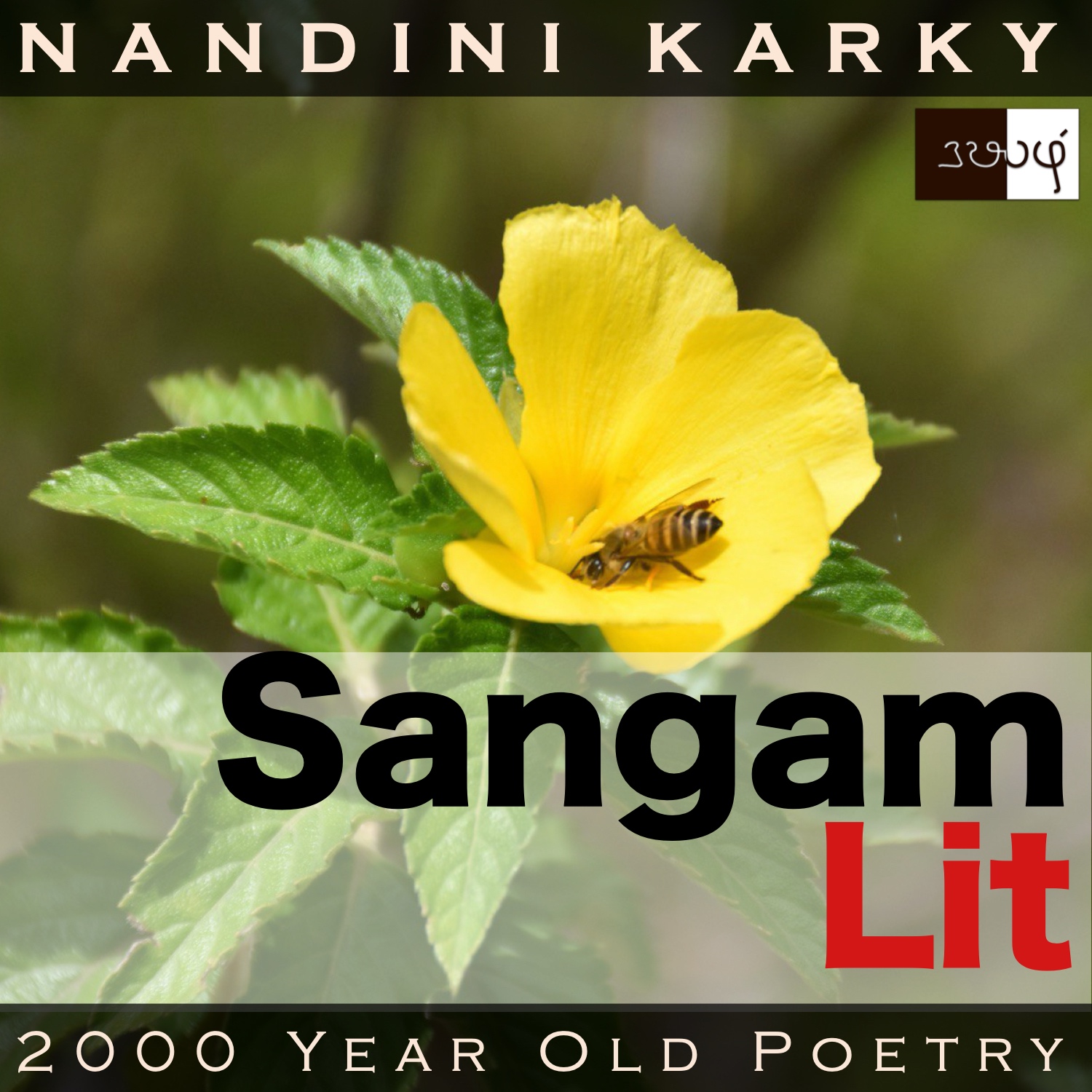Podcast: Play in new window | Download
Subscribe: Apple Podcasts | Spotify | Amazon Music | Android | iHeartRadio | TuneIn | RSS | More

In this episode, we perceive a unique way of expressing inner suffering, as portrayed in Sangam Literary work, Natrinai 277, penned by Thumbi Ser Keeranaar. The verse is situated in the drylands of ‘Paalai’ and speaks in the voice of a lady to a bee, expressing her anguish at the bee’s seeming indifference to her plight.
கொடியை; வாழி-தும்பி!- இந் நோய்
படுகதில் அம்ம, யான் நினக்கு உரைத்தென;
மெய்யே கருமை அன்றியும், செவ்வன்
அறிவும் கரிதோ-அறனிலோய்!-நினக்கே
மனை உறக் காக்கும் மாண் பெருங் கிடக்கை
நுண் முள் வேலித் தாதொடு பொதுளிய
தாறு படு பீரம் ஊதி, வேறுபட
நாற்றம் இன்மையின், பசலை ஊதாய்:
சிறு குறும் பறவைக்கு ஓடி, விரைவுடன்
நெஞ்சு நெகிழ் செய்ததன் பயனோ? அன்பு இலர்,
வெம் மலை அருஞ் சுரம் இறந்தோர்க்கு
என் நிலை உரையாய், சென்று, அவண் வரவே.
Opening with ‘கொடியை’, we see something addressed as ‘heartless’ and we learn that this something is a ‘தும்பி’ or ‘a bee’. The phrase ‘யான் நினக்கு உரைத்தென’ is filled to the brim with dejection, for it means, ‘what is the point of telling you?’. When we glimpse at ‘தாதொடு பொதுளிய தாறு படு பீரம் ஊதி’ or ‘swarming around the fruiting ridge gourd plant’s flower filled with pollen’, we understand what the said bee has been up to. The phrase ‘நாற்றம் இன்மையின், பசலை ஊதாய்’ meaning ‘owing to the lack of fragrance, you are not swarming around my pallor’ is intriguing because it implies that the pallor of pining that spreads on a lady’s form was imagined as a flower. Why because, as this phrase implies, there seems to be an expectation that a bee swarm around this pallor. The phrase ‘வெம் மலை அருஞ் சுரம் இறந்தோர்’ meaning ‘the one who parted away to the difficult-to-be-crossed drylands amidst the hot mountains’ describes the person and his actions that have wrought such pain in the lady. The verse ends on a note of accusation in ‘என் நிலை உரையாய், சென்று, அவண் வரவே’ meaning ‘you seem not to go there and speak of my state so that he would return’. Time to explore more!
The man and lady had been in a love relationship when the lady’s parents started receiving proposals from strangers, seeking the lady’s hand in marriage. Realising the gravity of the situation, the confidante and the lady reveal the lady’s relationship with the man to the lady’s parents. After the lady’s kith and kin accept the man, he parts away to gather wealth to offer to them towards his wedding with the lady. The time he promised he would return passes by and the lady suffers in love and pining. One day, seeing a bee buzzing near her, the lady turns to it and says, “You are cruel! May you live long, O bee! Let this affliction in me strike you too. Indeed, what is the use of telling you? Seems like not just your body is black but even your clear intellect is stained black. Do you think what you are doing is just? On that which spreads all around and guards this fine house, on that fence stitched with sharp thorns, blooms with pollen, the fruiting ‘peeram’ flowers. You swarm around this flower and suckle honey, but you don’t seem to part from it to swarm around the pallor that has bloomed on my skin, perhaps owing to its lack of fragrance. Or maybe it’s because you run to your little mate and delight its heart instantly! You seem not to go speak of my state to the loveless one, who has parted away to those impassable drylands amidst the hot mountains, and make him come here!” With these words, the lady gives vent to the pain in her heart at the man’s delay in returning to claim her hand in marriage.
Now, let us listen intently beyond the buzz of mere meaning! The lady’s anger, hurt and dejection comes out right away when she accuses a bee of being cold-hearted, wishes her own pain on the bee and concludes saying what is the point of talking to it anyway. Even after that dejected statement, she reverts back to anger and decides the bee’s intellect must be as black as its body. Then, she describes the scene where all this is unfolding! A fine mansion appears before our eyes in the first shot. Then, we zoom to the fence that surrounds this home. It’s a well-made fence, stitched together with small thorns. It makes me think it must be like an electric fence with a fine mesh that we see today although made from nature’s stingers – thorns! On this natural fence, nature finds refuge in the form of a ridge gourd creeper. The theme of the song may echo of the drylands but this is no dried-up creeper, for fruits hang down, echoing its fertility. However, it’s not the fruit that the poem zooms on finally, but a flower, filled with pollen. The bee is attracted to this yellow flower and seems to be doing what bees do best – suckle honey!
However, this seems to anger the lady for she accuses the bee of ignoring the flower that has bloomed on her forehead that we know as the pallor of pining. Then, she decides that it must be because this flower of pining does not invite the bee with its fragrance. Another reason could be that the bee seems to be intent on rushing to its mate and filling it with delight, the lady notes with resentment. The lady has come to the conclusion about the callousness of the bee as it seems not to fly to the man, who is far away in the drylands, in order to beckon him to return to the lady. Echoing an aspect in modern-day psychology known as ‘projection’, wherein a feeling within is displaced on another being, the poem shows us that here, it’s a bee that gets this treatment from the lady, who cannot accept her present and be!




Share your thoughts...